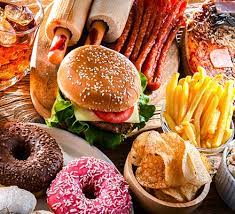A new research has linked eating certain types of foods with an early risk of death.
The 30-year Harvard study, published in The BMJ journal, tracked more than 114,000 adults, and found a link between consumption of the foods and the risk of dying.
But it turns out not all ultra-processed foods [UPFs] are created equal when it comes to health risks.
The strongest links were found between meat, poultry and seafood ready-to-eat products, such as sausages, ham, hot dogs, convenience meals and processed snacks.
These were followed by sugary and artificially sweetened soft drinks and then by dairy-based desserts.
The most harmful diets contain high amounts of ready-made processed meat and fish products, with these diets increasing the risk of death by 13%.


Diets high in sugary and artificially sweetened drinks had a 9% increased risk, while dairy desserts – such as cheesecake or fromage frais – were linked to a 6% higher risk.
While they often get a bad rap, breads and breakfast cereals were linked to just a 4% increase.
The study grouped participants into four groups based on how many UPFs they consume.
They found that those who ate the most ultra-processed foods overall were 4% more likely to die than those who ate the least.
This group ate on average seven servings of ultra-processed food a day, compared to three servings a day for the least.
In the years that followed, scientists identified 48,193 deaths from cancer, cardiovascular, respiratory and neurodegenerative diseases.
But it is important to note that this observational study, which means that while researchers can observe a correlation, they can’t say for sure that the ultra-processed foods were the cause of the deaths
Researchers said that while not all UPFs should be universally restricted, their findings “provide support for limiting consumption of certain types of ultra-processed food for long-term health”.
Following on from the study, we spoke to the nutritionists to find out what UPFs we need to try to avoid?
Processed meat, poultry, seafood
According to Kerry Beeson, nutritional therapist at meal prep service Prep Kitchen, processed meats like sausages, ham and bacon have been associated with a risk of high blood pressure (hypertension), heart disease, and bowel cancer.
Vassiliki Sinopoulou, registered dietitian and senior research assistant at the University of Central Lancashire says there are some other reasons to limit consumption.
“In the short term, contaminated meat, poultry and seafood, and their products, can cause food poisoning if they have not been handled according to food safety and hygiene regulations,” she advises.
“Consumers should only buy products from trusted purveyors. Also, consumers need to make sure they store them and prepare them properly according to package instructions and use by dates.”
According to Dr Laura Brown, senior lecturer in nutrition, food, and health sciences at Teesside University processed meats such as salami, hot dogs and bacon are now classed as a number one carcinogen.
“This is for many reasons, including causing increased inflammation in the body, which can also be said for sugary products, to high levels of salt which is linked to other diseases,” she advises.
“Poor-quality animals, especially those pumped with antibiotics, are not good to consume. We would always suggest organic and free-range meat over processed. If the meat is burnt, it has been exposed to carcinogens which some studies link to higher risk of cancer.”
Sinopoulou says processed or cured meat products like sausages, ham, and hot dogs can also be high in nitrites or nitrates.
“This has been linked to some cancers, alongside pregnancy complications and the elevation of certain toxins in the blood,” she explains.
“The high levels of saturated fats found in hot dogs, amongst other processed meats, have been linked to cardiovascular disease, diabetes, and some cancers.”
Convenience meals
Convenience meals often appeal to people because of their ease. “They require minimal preparation, if any at all, which means they can easily be over-consumed,” warns Sinopoulou.
“This can lead to bad dietary habits and unwanted weight gain, especially when not adequately combined with foods such as vegetables and salads, which contain important nutrients.”
Artificial sweeteners
According to Dr Brown new research has revealed the negative effects artificial sweeteners have on health. “They are manufactured, processed, and far removed from their natural state,” she explains.
Refined sugar
Refined sugar is one of the worst foods for your overall health. “It’s often a hidden ingredient so our daily intake can easily reach harmful levels,” Beeson explains. “Aside from the white stuff you put in your tea, it’s also in sweets, soft drinks, doughnuts, cakes, biscuits, desserts, and soft drinks. Less obvious sources include fruit juices, tinned foods, yoghurts, honey, alcoholic drinks, cereals, bread, pasta sauces and condiments.”
Beeson says bad bacteria and yeasts love sugary foods. “A diet high in sugary cakes, biscuits, white bread, soft drinks etc. can cause blood sugar spikes and dips,” she continues. “Spikes in blood sugar can suppress our immune function, and blood sugar dips create cravings for more sugary foods.
“Additionally, refined sugar is empty calories; it requires essential nutrients to metabolise it but doesn’t supply any nutrients itself, so can result in a nutrient deficit. If it’s not used as energy it will be stored as fat, contributing to weight gain.”
Overall diet is most important
While limiting the intake of certain ultra-processed foods could have an impact on long-term health, Sinopoulou emphasises that what matters most is a balanced diet.
“Processed foods can be eaten in moderation without issue,” she says. “Serving a ready meal with a salad, or a hot dog with vegetables on the side, can help to create a more rounded and nutrient-dense meal.”
Researchers also found that the most important factor to reducing risk of death is the quality of a person’s overall diet.
“There is also a correlation between maintaining a healthy diet and a BMI between 18-25 and lower risk of cardiovascular disease, diabetes, some cancers, and psychological wellbeing,” Sinopoulou continues.
“Prioritising home cooking where possible is a simple way to look after our health and wellbeing. With the amount of online content on cooking, there’s never been an easier time to learn how to cook.
“There are many healthy, fast, and delicious ways to make food at home. Whilst it can initially take some time to prepare, batch cooking can help to save time throughout the week. It can also prevent feeling stressed about deciding every day what to cook for dinner.”


